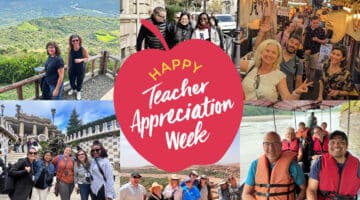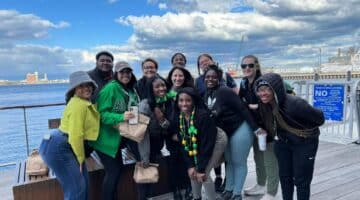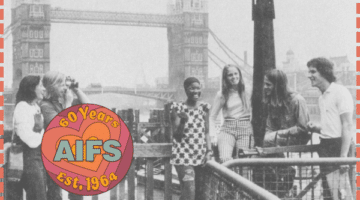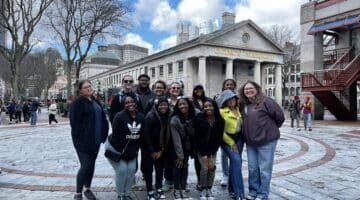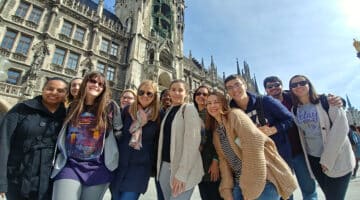The Importance of Teaching Hard History to Your Students
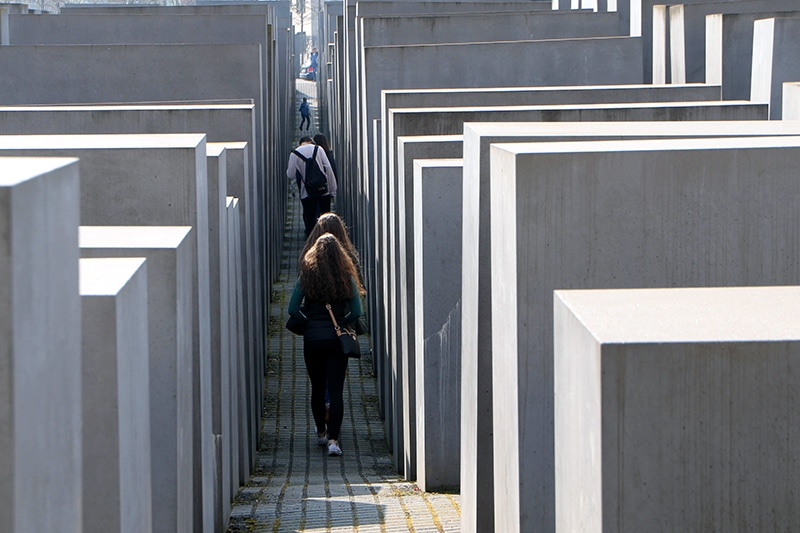
Growing up I always appreciated having a social studies teacher for a mother. Our summers were spent on cross country road trips, visiting presidents’ childhood homes and famous battlefields. Or when I needed one answer for my history homework and instead I got a 30 minute lecture because “history doesn’t happen in a vacuum” and you need to understand the whole story to fully grasp the history. She instilled a love of travel and appreciation of diversity, culture, and a deep sense of empathy for others.
As I got older, I was lucky enough to be brought along on her ACIS trips. I was able to experience the history I learned about in a whole new light. When I was in college, I joined my mom’s European War Tour trip. This was during my mom’s completing a Master’s Program in Holocaust and Genocide Studies. it was like we had our own person guide while walking through Berlin. I watched her explain the history and effects of the persecution of Jews and the Holocaust in Berlin to her students, many of which were Jewish. I was so impressed as this can be such a difficult topic to teach, especially to students who have been personally affected.
~Liz Cokeing, ACIS International Program Manager and daughter of the author of this piece Mary Cokeing, Teacher and ACIS Group Leader.
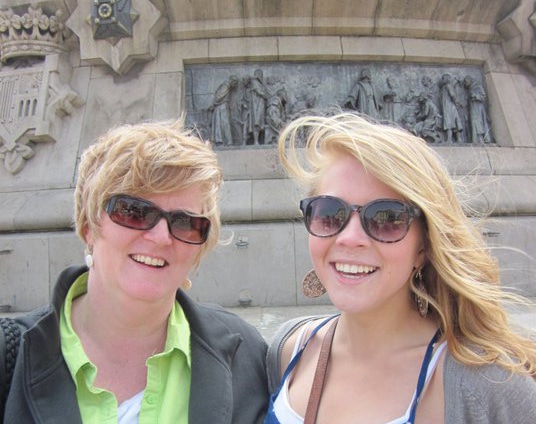
As January closed with Holocaust Remembrance Day and dovetails with February’s Black History Month I am sure that many teachers are working to incorporate various lessons into their classroom instruction despite the difficulties to do so.
There are so many obstacles to adding, what many view as extras into an existing curriculum from increasing pressures of assessments, sgos, observations and focus on curriculum maps, core standards to the overall educational focus becoming more and more STEM centric. It goes without saying that the additional pressures of teaching amidst a global pandemic have pushed many of us to the edge. Finding time to incorporate these lessons and devote time to the mandates that many states have implemented to focus on Holocaust education or African American history is becoming increasingly difficult. Sadly, this is happening at a time when it is increasingly more important.
Racism, anti-Semitism and hate-filled white supremacy are on the rise while at the same time surveys are showing that Holocaust education is lacking with respondents being unclear about the basic facts. Sixty-three percent of those surveyed did not know that 6 million Jews were murdered nor do they really understand why while almost 20 percent believe the Holocaust was caused by the Jews. 30 percent of respondents across all 50 states indicated that they had seen Nazi symbols on their social media platforms or in their community. (http://www.claimscon.org/millennial-study/)
A survey conducted in 2017 by Teaching Tolerance noted that Fewer than one-quarter (22 percent) of participating high-school seniors knew that “protections for slavery were embedded in [America’s] founding documents” and that slavery was a Constitutionally enshrined right rather than simply a southern “thing”. And fewer than four in 10 students surveyed (39 percent) understood how slavery “shaped the fundamental beliefs of Americans about race and whiteness” that have impacted American society since. (https://www.learningforjustice.org)
While it is as important to share the inspiring stories of the cultural and artistic pioneering African American heroes of American history as it to discuss the harrowing sacrifices made by people during World War II to rescue Jewish victims of the Holocaust, to focus only on these narrower avenues of African American or Holocaust history is a misrepresentation of the full story of each. The ability to go beyond these aspects is always important, but becomes vitally important in more tumultuous times.
Slavery is “hard history,” as is the Holocaust. It is hard to understand how the choices that started them were made; to discuss the inhumanity violence and brutality that sustained them; to teach the ideology of white supremacy and anti-semitism that justified them; to accept that there were people who stood idly by and/or benefited from them (including America’s role in the Holocaust). It is also often hard for teachers to allow for what could be uncomfortable conversations surrounding this hard history in the classroom – perhaps due to fear of confrontations of differing student opinions, perhaps a fear of parent reprisal, or even lack of overall content knowledge.
As difficult as these lessons and conversations may be to have, there are at least a few reasons why they are worth the discomfort:
1. Obviously, in the light of recent events, there needs to be an avenue for kids to voice their concerns about things happening around them, hear the concerns of others and together discuss how these events impact their lives and shape their communities and futures.
2. There needs to be an opportunity for students to gain a more in-depth understanding of our shared history that brought us to this point that they do not get from simply reading their usual course materials.
3. Just as importantly, there needs to be an opportunity for students to see themselves reflected in that shared history and that the political, economic and cultural contributions of ALL groups (as well as interactions among them) is what has helped to make our culture what it is today. These groups were also not of one-dimensional dehumanized victims, but vital persons who stood up, resisted, rebelled and persevered.
4. The need to identify and fight against prejudice, discrimination and hate is on-going. Discrimination is still the “hellhound” that MLK identified it as years ago and the lack of education about it is leaving students unprepared to combat it or worse helping them be complicit in it.
It’s ok to be uncomfortable. There’s nothing anti-patriotic in examining America’s great flaws and failings to gain an understanding of how we can learn from those mistakes to move closer to a “more perfect union.” Race, prejudice and discrimination are all part of American history. Ignoring it will not change that fact.
As Amanda Gorman eloquently states in The Hill We Climb, “It’s because being American is more than a pride we inherit, it’s the past we step into and how we repair it.” I would argue that we cannot repair “it” until we teach and learn about the wounds and scars that our mistakes left in their wake.
Resources and how to make teaching hard history easier



